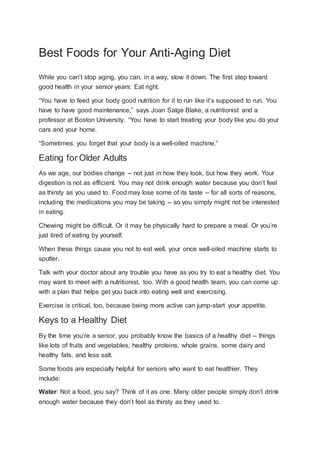
TOP ANTI AGING CREAMS
- 1. Best Foods for Your Anti-Aging Diet While you can’t stop aging, you can, in a way, slow it down. The first step toward good health in your senior years: Eat right. “You have to feed your body good nutrition for it to run like it’s supposed to run. You have to have good maintenance,” says Joan Salge Blake, a nutritionist and a professor at Boston University. “You have to start treating your body like you do your cars and your home. “Sometimes, you forget that your body is a well-oiled machine.” Eating for Older Adults As we age, our bodies change -- not just in how they look, but how they work. Your digestion is not as efficient. You may not drink enough water because you don’t feel as thirsty as you used to. Food may lose some of its taste -- for all sorts of reasons, including the medications you may be taking -- so you simply might not be interested in eating. Chewing might be difficult. Or it may be physically hard to prepare a meal. Or you’re just tired of eating by yourself. When these things cause you not to eat well, your once well-oiled machine starts to sputter. Talk with your doctor about any trouble you have as you try to eat a healthy diet. You may want to meet with a nutritionist, too. With a good health team, you can come up with a plan that helps get you back into eating well and exercising. Exercise is critical, too, because being more active can jump-start your appetite. Keys to a Healthy Diet By the time you’re a senior, you probably know the basics of a healthy diet -- things like lots of fruits and vegetables, healthy proteins, whole grains, some dairy and healthy fats, and less salt. Some foods are especially helpful for seniors who want to eat healthier. They include: Water: Not a food, you say? Think of it as one. Many older people simply don’t drink enough water because they don’t feel as thirsty as they used to.
- 2. “Water is so underappreciated. Our bodies are mostly water. If you’re chronically dehydrated, just think of what your cells look like,” says Robin Foroutan, a New York nutritionist. “You can’t think as clearly, you get fatigued more easily, you don’t tolerate heat as well Keys to a Healthy Diet continued... “People who complain of things like fatigue and mild headaches and constipation, most often they’re just dehydrated,” Foroutan says. Blueberries: “Always delicious,” says Angel Planells, a nutritionist in Seattle, “and packed with various antioxidants.” Antioxidants are things, like vitamin C or vitamin E, that can prevent or minimize damage to your cells. “You can’t go wrong with any of the berries, usually,” Planells says, “but blueberries really come packed with nutrients that are beneficial for the body.” Fiber: Dietary fiber -- from things like vegetables, whole grains, fruits, and legumes - - helps regulate your digestive system. That can help ease constipation, which is an issue for many older people. It can lower your cholesterol, blood pressure, and inflammation. That can lead to a healthier heart. Fiber can help control blood sugars and lower your risk of diabetes. And it helps you weigh what you should. That’s important because obesity can cause all sorts of problems. Salmon: A heart-healthy all-star, salmon (and other fatty fish like mackerel and sardines) are high in omega-3 fatty acids. They help prevent heart disease and stroke. Try to get at least two servings a week. Olive oil: A 2013 study showed a “significant” drop in “bad” cholesterol (LDL) and an increase in “good” cholesterol (HDL) among those given extra virgin olive oil. The experiment concluded that it helps increase your amount of the antioxidants we mentioned earlier. Yogurt: Bone loss gets worse as you get older. Calcium helps keep it to a minimum, and yogurt is a good source of it. Get yogurt fortified with vitamin D, which aids in the absorption of that key mineral. Yogurt also helps you digest your food, and it has protein, too. And add some fruit, Planells says. Tomatoes: Foods high in lycopene, like tomatoes, can help protect you against prostate cancer and may help prevent lung cancer, too. Cooked or processed tomatoes (like in juice, paste, and sauce) may be more effective than raw ones.
- 3. Researchers believe that heating or mashing tomatoes releases more of the fruit’s lycopene Red wine: Alcohol may be heart-healthy. It can help lower bad cholesterol, lessen blood clots, and ease your blood pressure. Go easy, of course. That usually means a drink a day for women and two each day for men, at most. If you don’t drink alcohol, don’t start. Broccoli: Filled with all sorts of vitamins and antioxidants, broccoli is high in fiber, too. It should be in everyone’s kitchen, Planells says. Nuts: Omega-3s, unsaturated fats (that’s the good kind), fiber, protein … nuts are heart-healthy nutrition in the palm of your hand. Shoot for five, 1-ounce servings per week. The following examples equal one ounce: 24 almonds 18 medium cashews 12 hazelnuts or filberts 8 medium Brazil nuts 12 macadamia nuts 35 peanuts 15 pecan halves 14 English walnut halves